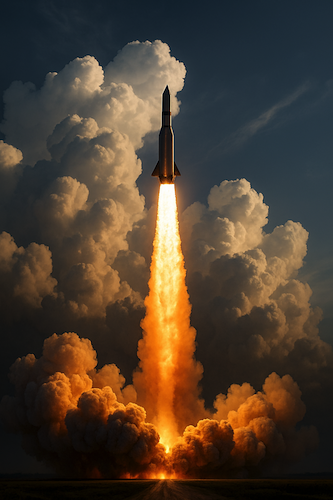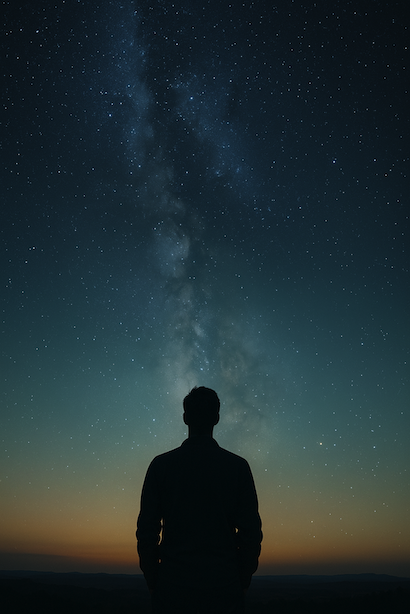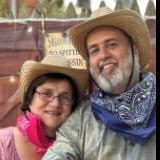It’s a “Wonder” Man Made It Off the Planet — a Glimpse of Wonder entry™ — 1 of 5
Long before rockets thundered into the sky, humans watched birds. We craned our necks, followed contrails with our eyes, folded paper planes, and built balsa-wood models just to see them float. One astronaut recalled getting his first ride in a barnstormer’s airplane as a child — a single loop around the family farm — and thinking this is it. That moment changed him. But flying wasn’t enough. Not forever.
You can see it in their eyes — the men who became astronauts. Even before they wore the uniform, before they climbed into spacecraft or caught a glimpse of the Earth from above — something was already stirring. A hunger. A tilt of the heart toward something higher. “I wanted to fly,” one of them said. “As fast and high as I could.” And when Alan Shepard blasted off in 1961 — making more noise, going higher, and flying faster than any fighter pilot had before — those watching didn’t just feel impressed. They felt pulled. How do I get that job?
There’s no denying it — politics got involved. So U.S. President John F. Kennedy stepped forward with a challenge — one that would shape the course of history. Land a man on the moon and bring him home, before the decade was out. Simple words — a staggering goal. It was as if someone pointed at the sky and said, “Build a ladder.” But somehow, we did. “We choose to go to the moon,” he said, “not because it is easy, but because it is hard.” Some laughed. Some doubted. And some just rolled up their sleeves.
There’s something beautiful — almost irrational — about aiming for the stars with the knowledge that you might fail. The engineers and astronauts didn’t know if their machines would hold. Early Atlas rockets were blowing up more often than they weren’t. But they kept building. They kept learning. And one day, they strapped three men to the top of a Saturn V — a skyscraper filled with explosives — and pressed the button.

 The launch of Apollo 11 wasn’t elegant. It shook and groaned and bellowed. The engines ignited, and the whole rocket trembled like it had stage fright. One astronaut described it as a nervous driver trying to thread a wide car down a narrow alley. They weren’t even sure it would clear the tower. And then — it did. The rocket broke free — pulling against gravity, against fear, against the limits of what humans thought they could do.
The launch of Apollo 11 wasn’t elegant. It shook and groaned and bellowed. The engines ignited, and the whole rocket trembled like it had stage fright. One astronaut described it as a nervous driver trying to thread a wide car down a narrow alley. They weren’t even sure it would clear the tower. And then — it did. The rocket broke free — pulling against gravity, against fear, against the limits of what humans thought they could do.
But why did they do it? Not to explore the heavens, or search for meaning, or honor their Creator. The space race was a contest of pride — a Cold War chess move played in the sky. Rockets were launched not to answer our deepest questions, but to prove whose flag could go higher. It was international posturing dressed as progress. And yet… even motives like that can’t erase the truth behind the action. Because when humans strive upward — even for the wrong reasons — it still tells us something: we look up. We imagine. We push. Not because the moon belongs to us, but because we can’t help wondering what lies beyond. And that wondering — that curiosity — is something Jehovah put inside us. “He has even put eternity in their heart…” (Ecclesiastes 3:11)
Maybe that’s why so many wonder whether Jehovah’s purpose might one day include travel to other worlds. The heavens stir something in us. Not because we belong out there — not yet, anyway — but because the stars remind us of how vast Jehovah’s creation really is. The galaxies weren’t made for conquest — they were made to inspire awe. And today, as telescopes peer deeper into space than ever before, we’re only now beginning to see wonders Jehovah placed there long ago — not for us to reach, but to revere. What his future purpose for the stars may be, we can’t yet say.
That yearning — that spark — doesn’t come from machines. It comes from the Maker of minds. The same One who designed Earth as our home also gave us the eyes to look past it — not from discontent, but from awe — and curiosity. When Apollo 14 astronaut Edgar Mitchell looked back at Earth, he described it as “a sparkling blue and white jewel” against the blackness of space (Awake!, June 8, 1971). That kind of beauty doesn’t just inspire science — it stirs the soul.
-
 2
2
-
 1
1
-
 2
2

1 Comment
Recommended Comments
Join the conversation with your brothers and sisters!
You are posting as a guest. If you are already a member, sign in now to post with your existing account.
Note: Your post will require moderator approval before it will be visible.